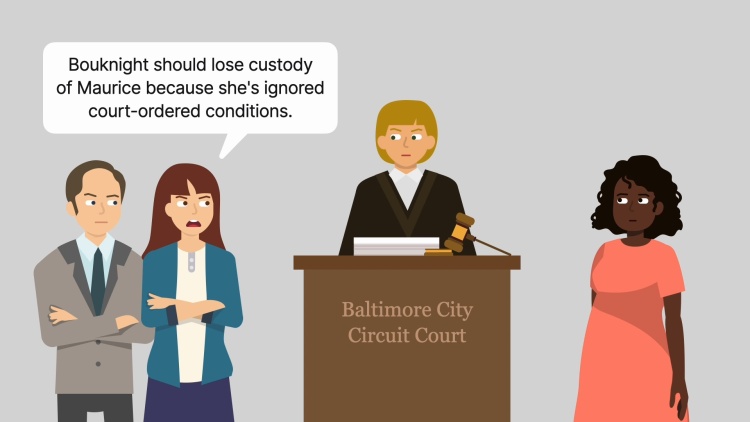Baltimore City Department of Social Services. v. Bouknight
United States Supreme Court
493 U.S. 549 (1990)
- Written by Shelby Crawford, JD
Facts
Bouknight (defendant) was suspected of abusing her infant son, Maurice. Baltimore City Department of Social Services (BCDSS, defendant) got a court order to take Maurice from Bouknight’s care. Bouknight was later given temporary custody of Maurice. Later, the court held that Maurice was a child in need of assistance and asserted jurisdiction over him. BCDSS allowed Bouknight to retain custody of Maurice subject to several conditions laid out in a supervision order that required Bouknight to cooperate with BCDSS. When Bouknight did not cooperate with BCDSS and violated other conditions of the supervision order, the court granted BCDSS’s petition to remove Maurice from her custody. After Bouknight refused to produce Maurice, the court held her in contempt. Bouknight argued that the contempt order violated the Fifth Amendment’s protection against self-incrimination. The court rejected this argument and stated that she could purge herself of the contempt order by producing Maurice, and that the contempt order was issued because she violated the court’s order to produce Maurice and not because she refused to testify. The court of appeals vacated the lower court’s order upholding the contempt order. The court held that the contempt order violated the Fifth Amendment by forcing her to admit, by producing Maurice, that she had ongoing control over him under circumstances where she would likely be prosecuted. The Supreme Court granted certiorari on constitutional grounds.
Rule of Law
Issue
Holding and Reasoning (O’Connor, J.)
Dissent (Marshall, J.)
What to do next…
Here's why 907,000 law students have relied on our case briefs:
- Written by law professors and practitioners, not other law students. 47,100 briefs, keyed to 996 casebooks. Top-notch customer support.
- The right amount of information, includes the facts, issues, rule of law, holding and reasoning, and any concurrences and dissents.
- Access in your classes, works on your mobile and tablet. Massive library of related video lessons and high quality multiple-choice questions.
- Easy to use, uniform format for every case brief. Written in plain English, not in legalese. Our briefs summarize and simplify; they don’t just repeat the court’s language.





